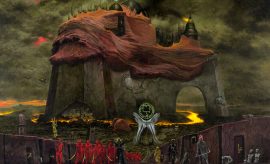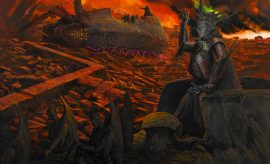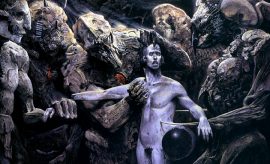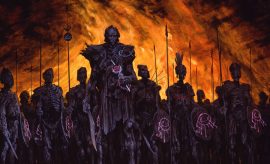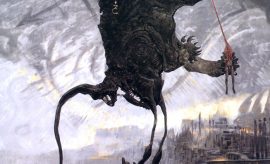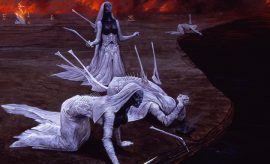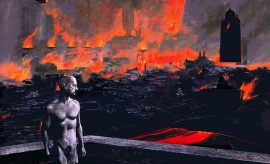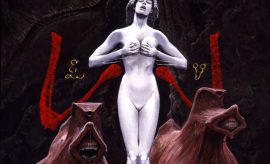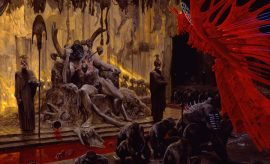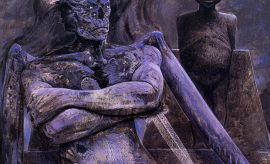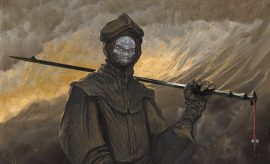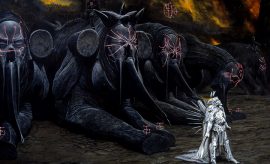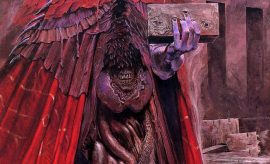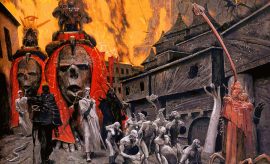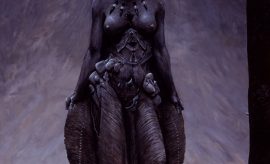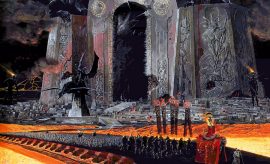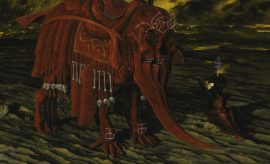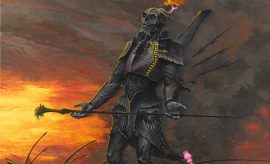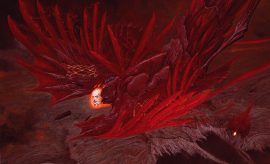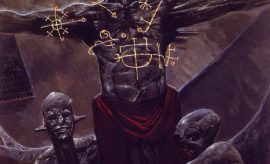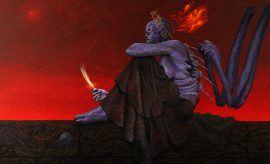We have featured the the unreal work of Wayne Barlowe before on CVLT Nation. Today we wanted to take a bit of a different approach, meaning below you find many of his works with descriptions written by the artist himself! To say that I’m a fan would not explain how much I’m enthralled by his creative spirit. His art goes beyond a human’s normal imagination to a place where the dark side has it’s own voice!
All Text & Illustrations Taken From Wayne Barlowe
Inferno
“Wayne Barlowe’s Inferno is an awesome visual work, taking us into a contorted landscape of the damned which Dante himself could never have imagined.” ~ James Cameron, director
“Wayne Barlowe conjures the Inferno with Boschian particularity. This is a unique volume by an extraordinary artist.” ~ Clive Barker, author
“Wayne Barlowe’s Inferno is a dangerous book. Human nightmares rear out of scale in this sulphurous landscape. Here every breath burns your insides and light flickers in perpetual agony. The Beast has found an architect.” ~ Guillermo Del Toro, director
- Beelzebub’s Keep – (unpublished – acrylic on Gessoboard) – There is no single construct in Hell that typifies the monolithic evil of its rulers more than this enormous edifice. Thousands of feet high, surrounded by lava and blanketed in a thick mantle of necrotic flesh, the Keep is an artificial mountain that encompasses the infernal seat of power. Built above the living tomb of an imprisoned Watcher, it is a labyrinth of claustrophobic tunnels and corridors that would take a lifetime to explore – if one had the courage. At its center rears Prince Beelzebub’s Dome, the largest domed structure in Hell, beneath which is its feared Rotunda, the Prince’s audience chamber. Whispered rumors do not begin to tell of the horrors it has witnessed, nor of the terrible orders which have issued from within its confines. There have been so many “evil” buildings rendered in paintings and for film that I was consciously trying not repeat anything I’d seen before. And I was also trying to beat the scale of the Wargate painting. I’m not so sure I accomplished that, but I am satisfied with its overall feel. (Note: I regard this painting as a work in progress.)
- Demolishers – (acrylic on Gessoboard) – Part of the vanguard of Dis’ army is its intimidating force of various engineering “vehicles”. Demolishers are among the largest soul-constructs found in Hell, each massive creation composed of hundreds of compressed souls. So heavy that they need supernatural augmentation to move, they are lumbering, building-crushing tanks capable of chewing their way through soul-bricks and natural stone alike. Only the thickest-built archiorganic structures can withstand the Demolishers which is why each is commanded by a powerful Demon Minor wise in the invocations necessary to further weaken them. Part of a private collection, this commissioned piece seemed, at first, impossible. As there are no vehicles or real machines in my Hell, I was confounded when the buyer asked me to invent a Hell-tank. The only solution that satisfied my world’s internal logic was to riff on the concept behind Agares’ steed as depicted in the INFERNO book. In that painting, the demon is seated upon a mount that is entirely composed of mashed-together souls, their multiple legs providing the locomotion. Once I licked that conceptual problem the painting was fun to execute. As I had just recently finished GOD’S DEMON and there was a scene involving Demolishers, this painting provided me a rare and serendipitous opportunity to envision a kinetic battle scene in Hell.
- The Examination – (from Barlowe’s Inferno – acrylic on ragboard) – While souls are treated as a resource by demons in an unthinkable number of ways in Hell, a true understanding of them as once-living organisms on a physical level is absent. The fact that Lucifer went to war in large part because of them has created a curiosity that many demons find irresistible. The inspiration for this painting is fairly obvious: all of those great Flemish paintings of medical examinations, of doctors gathered around splayed-out corpses. Nearly all of the look of the demons was improvised invention. I had a rough to work from and then, brush in hand, “grew” the figures on the board with layers of detail. I often do detailed drawings before putting paint on the palette but this was not the case with this painting. I wanted to enjoy the act of creating these inquisitive demons and felt that being too slavish to a sketch might make them less lively.
- Hannibal & His Army.
- Hell’s First Born – (from Barlowe’s Inferno, acrylic on panel) – A giant Abyssal stands upon a scalding field outside the walls of Adamantinarx. Sharing the world of Hell, the demons and Abyssals co-exist in an uneasy relationship with both sides preying upon each other. There is, however, an odd mutual respect between them. Hunted for their skins and their usefulness as war-beasts, many Abyssals evoke an attitude of savage respect from the demons, while, for their part, the more intelligent of the Abyssals keep their distance, understanding the innate superiority of the new-comers. This understanding doesn’t inhibit the native creatures one bit if the opportunity arises to waylay a group of demons that might have lost their way in the wild Wastes. The notion of a pre-existing fauna indigenous to Hell before the demons arrived opens up a whole line of conjecture. What would their evolutionary course be? What new life-forms could we find? While this painting represents a semi-intelligent individual, there must be countless Abyssals that are mere animals. Much as I did with EXPEDITION, I plan to do a series of wildlife paintings focusing on the fauna of Hell. One is underway as I write this.
- Unholy Communion.
- Barlowe’s Inferno – (from Barlowe’s Inferno – acrylic on panel) – The unpredictable chaos of Hell is present even in the most advanced of its cities. Dis, like all of its sister cities, suffers from wrenching, deafening upheavals that tear through the city breaking away and sending archi-organic buildings high into the air. These float about, sometimes leaving the city’s wards entirely, making their way into the darkness of the Wastes where they are never seen again. Do they eventually land only to be in habited by Salamandrine Men or Abyssals? Few have ever found out and fewer still have survived to tell of it. It was impossible for me to resist putting myself in the Hell that I created. Of course, I could not appear inappropriately whole and so, much like the demons themselves, I took up hook and tong and made myself suitable for place. When in Rome…
- Lilith.
- Lucifuge.
- Moloch.
- Salamandrine Man – (unpublished – Painter IX) – I discovered a reference to the Salamandrine Men or Men of Wrath in an old book and was immediately intrigued. I decided to transform them into the indigenous peoples of Hell, there long before the demons Fell and the Inferno was populated by the damned. I see them as fierce fighters, tribal and semi-nomadic, hunting Abyssals and waging a constant battle against not only the extreme elements of the Wastes but, also, the demons and souls. Aware that their era is coming to a close, their heightened bitterness compels them to acts of wanton aggression against any intruders who stray into their territories. This “painting” is a first for me. It is rendered entirely in Painter IX and represents my very first effort with that marvelous program. Starting as nothing but an experimental sketch, it took two days to render – a time that would have probably been double or triple that if I had used actual paint. For a very long time now I have been relatively skeptical about the ability of any computer rendering program to emulate the personal handwriting of an artist. I stand corrected.
- Sargatanas before the Behemoths – (from BRUSHFIRE: Illuminations from the Inferno, acrylic on ragboard) – Created primarily as siege weapons, the Behemoths can prove to be potent weapons upon the battlefield as well. Equipped with two massive bone-hammers and a heavy chin-blade these greatly enlarged souls are the once-cruel rulers of Asian empires transformed by the Demon Major Yen Wang to suit his needs. Donated to the Rebellion, they proved to be an invaluable military asset to Sargatanas. Think Hannibal. In many ways there’s a kind of duality in the story I’m trying to tell. While the historical Hannibal actually does appear in GOD’S DEMON, it’s Sargatanas who utilizes certain principles and elements from his life. Like his elephants which became these Behemoths. I find Hannibal to be fascinating figure from history; he’s on my short list of people I’d take a time machine back to meet.
- Sargatanas – (from Barlowe’ Inferno, acrylic on ragboard) – A former seraph and now a Brigadier General and Demon Major of enormous power, Sargatanas was a hero in Lucifer’s War with Heaven. Since his Fall, he has established himself as one of the few demons capable of rivaling the Prince for control of Hell. God’s Demon is his story. There’s a lot of improvisation in this piece. I wanted to leave some of the organically flowing elements, especially around his metamorphic head, to chance, to let my paintbrush do the thinking, as it were. And I also wanted to let the paint, itself, flow a little more freely to enhance the sense of dynamism this character has always had in my mind. Some have criticized my decision to go in a more “painterly’ direction with the Hell pieces. To me it is not only a natural evolution for a painter to become freer and more expressive, but, in this case, the milieu does afford one the perfect opportunity to be a bit more evocative. It’s a case of adapting oneself to the subject matter.
- The Streets of Dis – (from Barlowe’s Inferno – acrylic on ragboard) Hell’s capital is a teeming metropolis of many millions. A tangle of streets beyond count, the city’s arteries are clogged with work-gangs of souls and demons of every description.
- Succubus.
- The Wargate – (from Barlowe’s Inferno – acrylic on ragboard) – A massive procession snakes away from the second largest structure in Hell. Situated on the edge of a great lake of lava on the outskirts of Dis, the Wargate’s only rival in sheer scale is Beelzebub’s Keep itself. Built to commemorate those lost in the War with Heaven it also serves as the headquarters for Dis’ military. While most buildings in Dis are composed entirely of soul-bricks, the Wargate was erected around a natural volcanic plug, its outer surfaces smoothed by slave labor that took eons and countless souls to complete. Once the work-force was finished they were converted into the buildings that now stand at its base. As the first painting truly devoted to the Hell project this piece is a touchstone. The visual idiom that I created in this piece, from the colors to the archi-organic forms to the look of the demons, has found its way into nearly every subsequent Hell painting I’ve done.
- Watchtower.
- Decurion and Steed.
- Faraii Acquires His Sword.
- Sargatanas Descending – (from Barlowe’s Inferno – acrylic on ragboard) – Like all Demons Major, Sargatanas is a metamorphic being. Because distances between cities in Hell are considerable – determined for the most part by where the most influential demons Fell – the need to travel quickly between them is rare. Nonetheless, demons like Sargatanas are capable of sprouting great fan-like wings that bear some resemblance to their former seraphic or cherubic wings for just such journeys. Nearly all semblance of anthropomorphism is lost in this demonic form. Here potent glyphs stream away from the wings’ trailing edges, glyphs that not only keep the demon aloft but also delineate territories and can carry commands to nearby airborne troops. Even though he worked roughly two hundred years ago there is yet a transcendent majesty to William Blake’s vivid, mystical painting’s and etchings. His idiosyncratic style is still fresh and captivating and this painting is something of an homage to him. Blake was one of the most interesting artists and poets of his day and I would be remiss in not mentioning that he, too, fell under the spell of John Milton’s Paradise Lost, the single greatest influence on my Hell work.
- Belial in the New World (sketch).
- What Remains – (unpublished – acrylic on Gessoboard) – As much as Hell is a place of unrelenting horror and savagery it is, too, a place of sadness. What else could a being once of Heaven feel than sadness finding itself in such an environment? And what more poignant, precious reminder of its former existence could it possess after its Fall than one of its own charred feathers? Executing Hell paintings can be an exercise in pacing. After spending months completing very complex, detailed paintings I tend to gravitate towards simpler, more iconic compositions. This serves both to recharge my batteries and to force me to make more concise statements. To me the most difficult part of this painting’s concepting was whether or not to add a question mark after the title.


